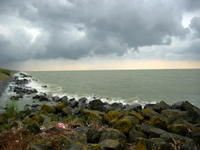Sopa da Pedra
 Standing on the Afsluitdijk last sunday I had suddenly a flush of understanding and respect for the Dutch Nation. I hear often appologies about how unstylish and rough Dutch people can be, but now I understand why. Dutch lived for centuries in the mudd, and they alone built their way out of it. A statue of three men in clogs carrying stones remembered me of that, as I walked into the souvenirs shop. I was immagining things like a set of two bottles of water, in different shades of brown: one from the Waddenzee, another from the Ijsselmeer, carefully arranged in a box... eheh. Instead, there were tulip bulbs and fake Delft croquery, like usual. The originality of the place streched into the menu of the cafe. Like everywere in Holland, there we could get chocomel, croquetten and gevulde cookies. I casted a deep sigh. It's still hard for me to understand how unimportant is food culture here.
Standing on the Afsluitdijk last sunday I had suddenly a flush of understanding and respect for the Dutch Nation. I hear often appologies about how unstylish and rough Dutch people can be, but now I understand why. Dutch lived for centuries in the mudd, and they alone built their way out of it. A statue of three men in clogs carrying stones remembered me of that, as I walked into the souvenirs shop. I was immagining things like a set of two bottles of water, in different shades of brown: one from the Waddenzee, another from the Ijsselmeer, carefully arranged in a box... eheh. Instead, there were tulip bulbs and fake Delft croquery, like usual. The originality of the place streched into the menu of the cafe. Like everywere in Holland, there we could get chocomel, croquetten and gevulde cookies. I casted a deep sigh. It's still hard for me to understand how unimportant is food culture here.We visited earlier an old graveyard, from the beggining of the 20th century. There were burried a lot of Jewish people, arranged by family names. The graveyard was very small and carefully looked after. R. showed me a couple of gravestones holding his familly name. "These were my ancestors".
There was a couple, Abraham W. and Martha W., placed side by side. It was strangely romantic. We like cemeteries. We can spend hours reading the slates and immagining the stories behind those names.
The day was over with a walk on the beach in Ijmuiden. It has been incredibly mild this season for Dutch standards, and it was gorgeous by the sea. R. walked with his sister 200 metres ahead of me. It was nice to watch them, the 34 year old man and the 13 year old girl, walking over the cracking shells and the hard brown sand. Behind them, his father and me discussed the meaning of life and the weight of history. He laughed and said it was fascinating how things become novelties again, as people forget about them. I had asked him what was the German Atlantic Wall. "When you're older you'll understand", he said.
Monday I had to find myself again. I searched the freezer and made a huge Sopa da Pedra that lasts untill today, as a Portuguese proud response to so much foreignessnesss...


1 Comments:
Whilst reading this “Sopa da Pedra” text I couldn’t stop my mind from thinking of "The Card-Players", by Philip Larkin. The Ekphrasis of a painting that does not exist and is still on everybody’s mind, the genius of the Dutch painting schools through the genius of the English literature.
The Card-Players
Jan van Hogspeuw staggers at the door
And pisses at the dark. Outside, the rain
Courses in cart-ruts down the deep mud lane.
Inside, Dirk Dogstoerd pours himself some more,
And holds a cinder to his clay with tongs,
Belching out smoke. Old Prijck snores with the gale,
His skull face firelit; someone behind drinks ale,
And opens mussels, and croaks scraps of songs
Towards the ham-hung rafters about love.
Dirk deals the cards. Wet century-wide trees
Clash in surrounding starlessness above
This lamplit cave, where Jan turns back and farts,
Gobs at the grate, and hits the queen of hearts.
Rain, wind and fire! The secret, bestial peace!
Philip Larkin
Yours – like Larkin’s – is also a critical eye (or just a foreign one!) that sees and weeps differently, a critical/foreign mouth that says and eats differently, and a critical/foreign finger that points at and scratches different faces of the same object. So, wanting to appreciate that “secret, bestial peace”, will you, like the poet, be able to maintain the distance of a stanza?
Babe
Post a Comment
<< Home